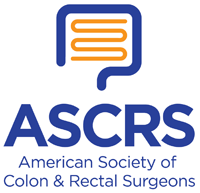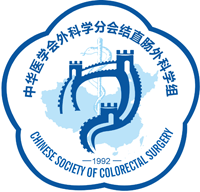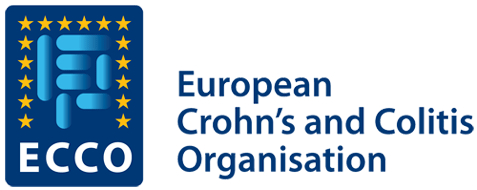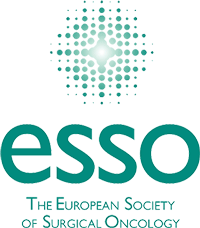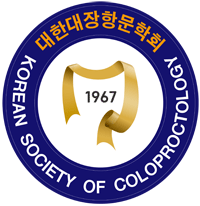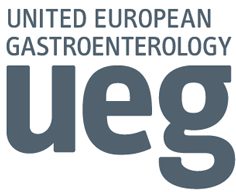ESCP offered one 3-month Fellowship, one 6-month Fellowship and 21 two and four week Observerships for 2018-2019. Fellows will be reporting here on their experiences.
We will be adding reports from fellows over the coming months. Click on a fellow's name to read their report
| Name | Country | Host Centre | Fellowship Type | Dates |
|---|---|---|---|---|
| Miguel Fernandes Da Conceiҫão Cunha | Portugal | Hospital del Mar, Barcelona, Spain | 6-month | March to August 2019 |
| Marjolein Leeuwenburgh | The Netherlands | Barts Health NHS Trust, London, UK | 3-month | April to June 2019 |
| Aristotelis Kechagias | Finland | University of Rome Tor Vergata, Rome, Italy | Observership | May 2019 |
| Cristian Blajut | Romania | Hospital Valle de Hebron, Barcelona, Spain | Observership | March 2019 |
| Cristian Gallardo | Chile | Bordeaux University, France | Observership | June 2019 |
| Gabrielle van Ramshorst | The Netherlands | Clinic of Colorectal and Endoscopic Surgery Sechenov First Moscow State Medical University, Russia | Observership | December 2018 |
| Gregory Thomas | United Kingdom | Elisabeth-TweeSteden Ziekenhuis, Tilburg, Netherlands | Observership | February 2019 |
| Hemanga Kumar Bhattacharjee | India | Leeds Teaching Hospital NHS Trust, Leeds, UK | Observership | May 2019 |
| Ines Rubio Perez | Spain | Royal Brisbane Hospital, Australia | Observership | March 2019 |
| Jeryl Anne Silvia Reyes | Philippines | St Mark's Hospital, Harrow, UK | Observership | June 2019 |
| Laura Koskenvuo | Finland | Bordeaux University, France | Observership | January 2019 |
| Mariana Morales Cruz | Mexico | Beaujon Hospital, Clichy, France | Observership | February 2019 |
| Miguel León | Spain | Geneva University Hospitals, Switzerland | Observership | February 2019 |
| Najia Azhar | Sweden | Mater Misericordiae University Hospital, Dublin, Ireland | Observership | September 2019 |
| Nikolai Kovachev | Bulgaria | Mater Misericordiae University Hospital, Dublin, Ireland | Observership | April 2019 |
| Nuha Yassin | United Kingdom | Hospital Valle de Hebron, Barcelona, Spain | Observership | July 2019 |
| Olena Karbovnycha | Ukraine | Bellvitge University Hospital, Barcelona, Spain | Observership | Nov-Dec 2018 |
| Orestis Ioannidis | Greece | Medical University of Vienna, Austria | Observership | March 2019 |
| Plamen Petkov | Bulgaria | Aarhus University Hospital, Denmark | Observership | January 2019 |
| Sofia Xenaki | Greece | Geneva University Hospitals, Switzerland | Observership | April 2019 |
Aristotelis Kechagias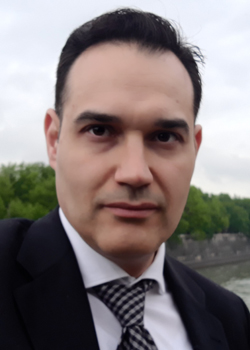
From: Kanta-Häme Central Hospital, Finland
Visited: Tor Vergata University Hospital, Rome, under the direction of Professor Pierpaolo Sileri
I would like to express my gratitude for the benefit I gained from my ESCP Observership, and to thank ESCP for this wonderful opportunity and Professor Sileri for hosting me.
I had the privilege to attend the Department of Colorectal Surgery, Tor Vergata University Hospital, Rome, under Professor Pierpaolo Sileri for two-weeks. The reason that I wished to visit this department was due to its high clinical and academic profile, particularly in the field of the pelvic floor and proctologic surgery.
Overall, my experience was very positive. A key point for me was that Professor Sileri got in touch with me prior to my Observership to get acquainted with my background, interests, and expectations. This was very useful and enabled them to tailor the content of this Observership to my level of experience and needs.
During my time at the hospital, I followed all activities concerning the surgery of the pelvic floor and of the anus. This is an elaborate field of the diseases of the lower gastrointestinal system with numerous emerging procedures and with continuous advancement of the surgical knowledge. In my opinion, there is significant variation between centers and between countries regarding clinical management in this sector. I had the unique opportunity to attend and view closely the preoperative work-up, surgical methods and alternatives, and the post-operative outcomes from a department with a leading role in pertinent clinical research. This Observership provided me with various important take-home messages mainly regarding the use of porcine mesh in laparoscopic anterior rectopexy, the indications of the STARR procedure, and the most modern evidence-based procedures in proctology and in minimally invasive surgery of perianal fistulas and pilonidal sinus. I had full convenience to discuss in depth the benefits and risks concerning the treatment of proctologic and pelvic floor pathology with Professor Sileri and his collaborators, gaining a thorough and valid overview.
In conclusion, this Observership fully covered my expectations and indeed, it will enable me to introduce new aspects in my clinical approach and practice. In addition, I would like to emphasize the kindness and hospitality of Professor Sileri and his team, as well as of the staff of Tor Vergata Hospital. I am very grateful to the ESCP and to Professor Sileri for having this unique opportunity.
Cristian Blajut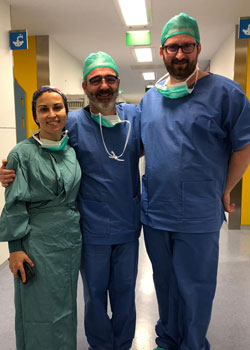
From: Central Military Emergency University Hospital, Bucharest, Romania
Visited: Vall d’Hebron Hospital, Barcelona, Spain, under the direction of Professor Eloy Espin Basany
I would like to express my gratitude for being selected for an ESCP Observership in Barcelona, Spain, at Vall d’Hebron Hospital, under the supervision of Professor Eloy Espin Basany.
My main objective during this visit was to observe different aspects of colorectal surgery in order to improve my skills and utilise them back at home. As a young surgeon, and a coloproctology enthusiast, to be able to be involved in daily activities at a prestigious European colorectal center, was an immense joy and a great opportunity.
During my visit, I observed several laparoscopic and robotic colorectal surgeries, as well as several proctology procedures. It was a very educational process because Professor Espin and the team took the time to explain all the key steps of the procedures and some 'tips and tricks'.
I also took the time to visit the beautiful Barcelona, the home of Gaudi and FC Barcelona.
I am sure that the experience and knowledge I gained during this observership will be very useful for my professional development. I wholeheartedly recommend this wonderful institution to future observership applicants.
Cristian Gallardo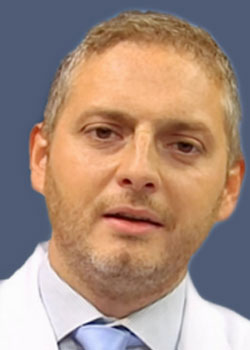
From: Hospital Clínico San Borja Arriarán, Santiago, Chile.
Visited: Unité de Chirurgie Colorectale, Hôspital Haut-Lévêque, Universitè de Bordeaux (France), under the direction of Professor Eric Rullier.
First of all, I would like to express my gratitude to the ESCP for being awarded one of the 2018/2019 ESCP observerships. I believe this is an extraordinary opportunity for someone who comes from as far away as Chile.
I spent the two-week fellowship at Hôspital Haut-Lévêque under the direction of Professor Eric Rullier and Dr Denost. I chose this unit because it is a prestigious, high-volume centre for all types of colorectal diseases; it is a referral centre for the whole Aquitania region and from all parts of France, performing over 600 colorectal operations per year, mainly with MIS techniques.
One of the most remarkable features of the unit is that it exhibits a great team work in which residents, assistants and consultants are all involved in the surgical practices, which permits them to run two to three operating rooms to cope with their high workload.
The unit is internationally renowned for laparoscopic surgery, which gave me the unique opportunity to take part in a broad variety of laparoscopic and robotic procedures.
The highlights were several, but TaTME, the focus of my visit at this hospital, was outstanding. I was very fortunate that my stay coincided with two 3-day TaTME workshops at the hospital which Professor Rullier permitted me to attend.
In general, this clinical fellowship provided me with an excellent opportunity to improve my surgical skills and clinical knowledge in colorectal surgery.
I am very grateful to Professor Eric Rullier, Dr Quentin Denost and their entire team for their warm and kind reception.
I left with a great deal of admiration for the volume and high-quality surgery being performed in their unit which will give me much to consider in the beginning of my career as a colorectal surgeon.
Gabrielle van Ramshorst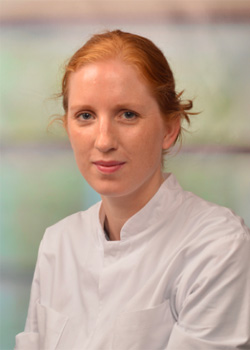
From: The Netherlands
Visited: Clinic of Colorectal and Endoscopic Surgery, Sechenov First Moscow State Medical University, Moscow (Russia), under the direction of Professor Petr Tsarkov
In a few years’ time, patients with isolated para-aortic lymph node metastases of colorectal cancer will be offered debulking surgery as part of regular treatment. In some centres, these resections are already part of standard surgical resections for colorectal cancer. The centre of expertise for this procedure is the IM Sechenov First Moscow State Medical University, and one of the most experienced colorectal surgeon in this field is Professor Petr Tsarkov.
During my Observership, I developed my experience in iliac and para-aortic lymphadenectomy. I have also been working to promote an international registry for these cases. In November 2018, I learned how to perform retroperitoneal lymphadenectomy laparoscopically (extraperitoneal/intraperitoneal) at a workshop organised by ESGO. Following this, I felt very fortunate to have been accepted for the ESCP observership by the education committee. Professor Petr Tsarkov and Dr Inna Tulina offered me great help to secure a visa and accommodation. During my stay, I spend a lot of time with the consultants Dr Tatiana Garmanova, Dr Yury Kitsenko, Dr Sergey Efetov and Dr Daniel Markaryan. They showed me their surgical skills, and we discussed surgical strategies, training and the basics of Russian, which would prove helpful during the rest of my stay.
During my stay, Dr Yury Kitsenko defended his PhD thesis on the topic of J pouch surgery in patients with longstanding ulcerative colitis. This procedure is only performed in ten centres across Russia, often as part of a three-stage procedure. It was interesting to observe the differences and similarities of this academic ritual between Russia and the Netherlands.
Monday mornings started with a group meeting, where all colorectal consultants met and discussed difficult cases with registrars. Individual vascular anatomy was emphasized, with coronal CT-angiography reconstructions and schematic representations for all planned oncological resections. The multidisciplinary team conferences provided good opportunities for comparison of treatment strategies and discussion.
The unit's operating theatres were busy as Christmas was only two weeks away, and one of the wards was under reconstruction. On an average day, 10-11 operations would be planned. Operation complexity could range from minor proctology to laparoscopic or open abdominoperineal resections with lateral and/or para-aortic lymphadenectomy. Professor Tsarkov and the other consultants showed excellent examples of meticulous dissection, with again, great emphasis on identification of embrylogical planes and vascular structures. In between procedures, we had intense discussions about surgical strategies and research.
During my Observership I was kindly invited to Moscow’s beautiful and safe old city centre, the Kremlin museums, the Tretyakov gallery and to two group dinners. In conclusion, the team and the hospital were perfect hosts for this observership and I recommend future fellows to choose this centre for their stay. Beware that public speaking is considered an important virtue in Russian culture. Be prepared to give at least one speech!
Gregory Thomas
From: Ashford and St Peter’s NHS Trust, United Kingdom.
Visited: ETZ Tweesteden Hospital, Tilburg, Netherlands, under the direction of Professor David Zimmerman.
I am a recently appointed consultant colorectal surgeon. I have any interest in proctology and pelvic floor surgery. I was recently awarded an ESCP travelling observership 2018-19. In February 2019, I had the priviledge to visit the colorectal unit at the ETZ Tweesteden Hospital in Tilburg, Netherlands. My host was Professor David Zimmerman. He is a consultant colorectal surgeon and is head of the department. He has a sub-specialist interest in complex anal fistulae. He has developed a tertiary practice in this area. Alongside this, he has a busy colorectal practice including a high volume laparoscopic colorectal cancer service (well over 200 cancers per annum).
My visit allowed me to observe a high of number of laparoscopic cancer resections, attend outpatient clinics and the colorectal cancer multidisciplinary team meeting.
This visit gave me the opportunity to observe and to learn about Prof Zimmerman’s fistula practice and to understand his approach to this, often very difficult problem. In particular, he has significant expertise in the anal advancement flap. I was fortunate enough to be able to observe this operation. As a trainee, I had not come across this procedure in the UK. I look forward to incorporating this into my practice in the UK.
Prof Zimmerman and his team were fantastic hosts. I would like to thank him and his team for their hospitality and support during my visit. I would also like to thank the ESCP for giving me this amazing opportunity.
Hemanga Kumar Bhattacharjee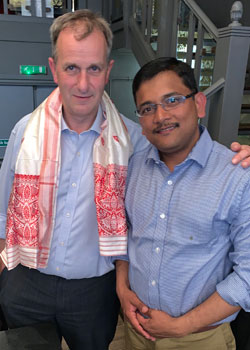
From: All India Institute of Medical Sciences New Delhi, India
Visited: John Goligher Colorectal Surgery Unit, Leeds Teaching Hospitals NHS Trust, United Kingdom, under the direction of Professor David Jayne
First I would like to thank the European Society of Coloproctology (ESCP) for awarding me a two-week observership at a premier colorectal centre in Europe. As a part of this award, I visited the John Goligher Colorectal Surgery Unit, Leeds Teaching Hospitals NHS Trust, under the mentorship of Prof David Jayne.
I am grateful to Prof Jayne for agreeing to mentor me. He personally supervised various academic, logistical and social concerns so that I gained maximum benefit from the observership and carried home pleasant memories. His secretary, Ms Amanda Smith, organised all my paper work and accommodation in the University Guest House which is reasonably priced and located very close to the hospital. The guest house staff were extremely helpful, warm and thoughtful; I express my sincere gratitude to them all.
On the first day, Prof Jayne accompanied me to a department clinical audit meeting. In the meeting, consultants present the outcome of their cases, nurses present the hospital infection rate, any history of falls and any occurrence of a 'never event', and finally residents present a topic. It was very cordial, partially structured and informative. Prof Jayne introduced me to the members of the department, including colorectal Fellows Mr Gaurav, Mr Nitish and Ms Mal who guided me to the operation theatres, clinics and wards, so that I got oriented to the hospital environment quickly.
Next day, I shadowed Prof Peter M Sagar, an accomplished rectal surgeon. I accompanied him to the operation theatre, high dependency unit, on his clinical round and to a multi-disciplinary treatment meeting (MDT). Besides experiencing his master strokes in rectal surgery, I also witnessed his ability to explain a complex condition very lucidly to patients, so that they understand their disease status correctly and are able to make a decision on their treatment. It was also impressive to see how a nurse equally takes part in the decision-making process, along with the treating physician and the patient. I sincerely thank Prof Sagar; he, in spite of his busy schedule, found time to explain how the health care system works in the UK. Knowing fully that I work in India and follow a different system, he pointed out the advantages and disadvantages of health care systems across the globe. These were completely new insights to me.
I attended their multi-disciplinary treatment (MDT) meeting. During the MDT, consultants from various clinical disciplines, including radiotherapy, medical oncology, pathology, radiology, sit together to discuss a clinical case and design the roadmap for treating the patient. Back home, in my institute, we also have MDT, however, they are functionally and structurally different. I really enjoyed attending the MDT.
I attended two outpatients’ clinics with Prof Jayne and Mr Sushil Masleker. It was very impressive to see how every patient is entertained in a warm and secure environment. Each patient’s privacy is maintained with outmost care and provided stipulated time for discussion and information on their disease and treatment. The mandatory requirement for the consultant to write a letter to the referring general practitioner informing him of the patient’s condition is very intriguing.
I attended the GI physiology laboratory with Mr John Casey and GI radiology with Dr Damian Tolan. Mr Casey demonstrated the various aspects of ano-rectal manometry, ano-rectal ultrasound and the pudendal nerve latency test. All these tests were new to me. Dr Tolan taught me how to evaluate a defecating proctogram for pelvic floor disorders. He discussed with me various MR fistulogram in complex anal fistula patients and MRI pelvis for evaluation of rectal cancer. He also introduced me to the 'Check NG Tube X-ray' protocol to avoid inadvertent NG aspiration.
The department ran two operating theatres each day. I had the privilege to visit theatres every day and to interact with the operating consultants. Although we also carry out many of these procedures back home in my institute, it was of great interest to see how the same procedure can be done in a different way. Observing experts doing a particular procedure helped me pick up the nuances of some specific steps of these demanding procedures. Many a time, I found it difficult to manage those critical steps in my own clinical practice. I have gained new ideas and elegant ways to execute those particular steps in various demanding operative procedures. This know-how is one of the major take-homes from this observership. Two surgical procedures I have learnt here for the first time are laparoscopic placement of pudendal nerve stimulator and placement of sacral nerve stimulator for faecal incontinence. I also had the opportunity to observe transanal total mesorectal excision (TaTME). These procedures are not done in my home institute. I thank all the consultants of the department specially Mr Riyad, Mr Saunders and Mr Hance as well as Mr Masleker, Mr Sagar and Dr Jayne for allowing me to visit their theatres, making me feel at home and replying to my queries during and after the operative procedure.
Another observation, more on a philosophical note, was the interpersonal relationship among residents, fellows and consultants. Each consultant took utmost care that fellows/residents learn something from every aspect of their experience in patient care. I was impressed by their camaraderie and cordiality. There was no sense of fear or anxiety in the mind of a resident for his seniors. They were all equally comfortable asking questions, giving opinions and participating in the procedures. Residents and fellows were always at ease, be it in the operation theatre, ward rounds or in clinics. I developed a deep sense of respect and gratitude for the consultants for their unlimited patience to assist, teach and train their juniors during the operative procedures. During the two weeks of my visit, almost 90% of the operative procedures were performed by fellows/residents while consultants only assisted them. They masterly supervised the procedure, imparted hands-on assistance and took over the operating role only during difficult phases, making surgery a smoothly-supervised and an enjoyable learning process. I look forward to embrace a similar philosophy in my practice.
Cumulatively, it was an enriching experience for me. I belong to a non-European country and had medical/surgical education following a different system. I found many aspects distinctly diverse. The difference was not only in patients’ care or delivery of services but also in interpersonal relationship and maintenance of work-life balance. It provided me new and fascinating insights in the professional as well as personal aspects of life. Prof Jayne is a great mentor. He continuously made efforts to make my visit fruitful. We also discussed designing multicentre clinical trial on anal fistula and possible participation of my institute in the trial. I have no words to express my sincere thanks and utmost gratitude to him. I strongly recommend the John Goligher Unit of Colorectal Surgery for ESCP’s future observers.
Ines Rubio Perez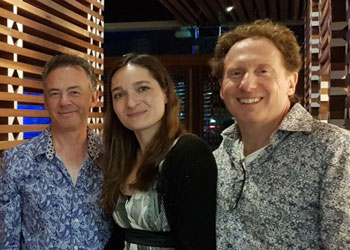
From: Hospital Universitario La Paz, Madrid, Spain
Visited: Royal Brisbane and Women’s Hospital (RBWH), Brisbane, Australia, under the direction of Professors Andrew Stevenson and David Clark
I had the immense pleasure of being selected for my ESCP observership in Brisbane under the supervision of Professors Andrew Stevenson and David Clark. From Day 1 they made me feel welcome, asked about my interests and helped me to organise my week and select the surgeries or other activities to make the most out of my stay.
I was able to observe a wide variety of procedures, including advanced colorectal laparoscopic surgery, robotic surgery, taTME, pelvic floor procedures, SNS, proctology, and pelvic exenteration. I was also able to attend rounds, MDT meetings, outpatient clinics and colorectal investigations. Since the professors worked both in public and private practice, I joined them in both settings and made the most out of my days! During my observership, I was also able to participate in other interesting activities, like the Brisbane Functional Colorectal Conference (15-16 March 2019), advanced colorectal laparoscopic course (live surgeries), hand-assisted laparoscopic surgery course (with cadavers), the Brisbane Journal Club and RBWH Grand Rounds. Brisbane was a beautiful city, safe and easy to move around, so I also enjoyed my weekends there and had some time for leisure.
I would like to express my deepest gratitude to them and their team for making my stay in Brisbane such a great experience. The working environment in Brisbane was fantastic, all members of the team were true professionals and very warm and welcoming. I really appreciated the great interaction, with the professors always happy to answer all my questions, describe technical details and give tips and tricks. I was also very impressed with their high level of quality and surgical outcomes.
I am also very grateful to ESCP: this observership has provided me with an excellent opportunity to improve my understanding of colorectal procedures and indications. I have learned practical tips and tricks that I will be able to apply to my daily practice (and share with colleagues too!) and I'm sure will help to improve my surgical performance. I also had the opportunity of meeting amazing surgeons that I deeply admire and hope to keep in touch with!
Jeryl Anne Silvia Reyes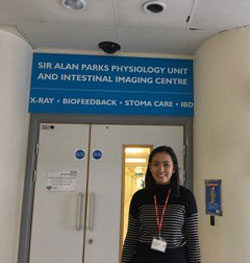
From: Colorectal Clinic, The Medical City, Ortigas Avenue, Pasig City, Philippines
Visited: St Mark's Hospital and Academic Institute, Harrow, United Kingdom, under the direction of Professor Sue Clark and Miss Carolynne Vaizey
I am extremely grateful to the European Society of Coloproctology for awarding me one of the 2-week Observerships for 2018-2019, and even more so for allowing me to observe at St Mark's Hospital and Academic Institute in Harrow, United Kingdom. As all students and practitioners of coloproctology know, St Mark's Hospital has been one of the pioneers of the specialty, where numerous concepts and procedures have been invented and developed, most of which are still applied to our patients today.
It was fortunate that, just as I started my Observership stint on 17 June, the department was holding Benign Proctology Days, which they have been doing every year. I attended this 2-day meeting which focused primarily on pelvic floor disorders and fistula management, two of the areas I am most interested in. It actually gave me an overview of how these are managed in St Mark's, which in turn helped me direct my focus on which aspects I wanted to learn more of and which consultants or medical personnnel I needed to interact with to achieve my objectives. Through this meeting, I learned how they have developed the Pelvic Floor Multidisciplinary Team, which also gave me ideas on how to push for this same approach in my country, as there is no established system in place yet. I learned about the new techniques in fistula surgery, and it was interesting to see how different surgeons have different ways of managing this difficult benign condition, but still rooted on the basic principles of fistula closure. Coming from Southeast Asia myself, I realised there were a lot of other techniques to learn which may, or may not, work with my patients back home.
For the succeeding days, I was able to observe different surgeries in the theatres: examinations and procedures for pouch complications by Professor Sue Clark, sacral nerve stimulation (SNS) with Miss Carolynne Vaizey's team, laparoscopic colorectal operations by Professor Omar Faiz, robotic right colectomy by Mr Danilo Miskovic, open surgeries for locally advanced malignancies by Mr Ian Jenkins, and several fistula procedures by Mr Janindra Warusavitarne and Mr Phil Tozer. It was a good variety of surgeries, although I did also feel that the two weeks was too short a time to see the full range, especially specific procedures for pelvic floor disorders, which was my main interest for coming to St Mark's. However, because there was a live surgery session during the Benign Proctology Days, I was able to see the unique style of laparoscopic mesh rectopexy by Mr Warusavitarne.
Relating to the pelvic floor interest, I spent several days with the biofeedback team at the Sir Alan Parks Physiology Unit, trying to get a feel of how patients journey from diagnosis, to preoperative preparation, to surgery if necessary, and then to postoperative rehabilitation. Alternatively, some patients' main treatment may be the biofeedback itself, and I wanted to observe how the nurses and physiotherapists interact with and manage this diverse group of patients. I was able to observe how their physiologist Alex performed anorectal manometry, as well as how Ellie Bradshaw and her team (Rebecca, Lucy, Shaila) counsel patients with different pelvic floor complaints. It highlighted to me how similar patients' concerns are, whether they are in Europe or Asia, and I was able to pick up some pointers on how I may also help my own patients.
Some of the afternoons, I went down to the outpatient clinics to observe the consultations. What was particularly interesting to me were the cases of pilonidal disease, mostly handled by Miss Asha Senapati, and the cases of pelvic pain that I saw in Miss Vaizey's clinic. Pilonidal disease is not very common in Asia, although we have been seeing more cases recently, and because personally I have not had much experience in my own training, it was enlightening to see both successes and failures of surgical management. Although I wasn't able to see the actual procedures, Miss Senapati had already explained and showed the principles to us during the proctology meeting, so the outpatient exposure just completed the whole picture.
Naturally I was very interested in the variations of pelvic pain complaints, and I saw how Miss Vaizey and the fellows tried to find ways to help these patients whether surgically or medically, and even psychologically, as pelvic pain is a difficult condition to understand and manage in itself. It also emphasized to me again how similar the symptoms and complaints can be across different races and cultures, as I receive these kinds of referrals also in my practice. I was able to gain insights and learn some strategies on how to manage them, as I find I am frequently stumped with these kinds of problems also.
Lastly I also sat in on the SNS clinic managed by the SNS fellow and Ellie, who is also the SNS nurse. At present, we are not able to offer this treatment in the Philippines, but I will be aiming to bring this modality to the country. I have actually registered for a training workshop this year, which will hopefully move things along more quickly. I believe it is a valuable treatment approach for incontinence, and one that we should be able to offer to Filipino patients. In this clinic, I was able to see how some patients respond to the treatment and how programs may be tweaked to bring about maximum benefit for them.
All in all, it was a very good learning experience, as a surgeon and as a person, in general, because immersing oneself in a different cultural environment is always enriching for the soul. At the same time, I was very proud to learn that there are a lot of Filipino nurses and staff in St Mark's, who are doing very well in the UK, and they have helped me to adjust quickly to the routines of the hospital. They were very happy to see a surgeon visiting, this time, and I realise I should encourage more of my fellow Filipino surgeons to visit, and maybe train, in centres in Europe, too. And, as a tourist, it also certainly helps that London has so many attractions and one won’t run out of things to see and do in the city! This just made my first trip to the UK all the more special.
Thank you again to the fellowship and training committee of the ESCP for the opportunity. The Observership has enlightened me and opened new possibilities for my career as a colorectal surgeon and pelvic floor specialist. Looking forward to visiting Europe again soon!
Laura Koskenvuo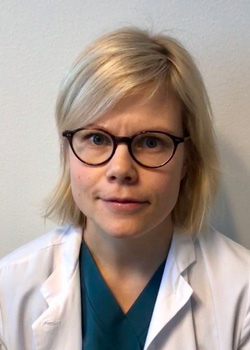
From: Helsinki University Hospital, Finland
Visited: Unité de Chirurgie Colorectale, Hôpital Haut-Lévêque, Université de Bordeaux (France), under the direction of Professor Eric Rullier
I had the privilege to visit Hôspital Haut-Lévêque in Bordeaux in January 2019. I stayed there for two weeks under the supervision of Professor Eric Rullier. I was particularly delighted to receive my observership place from Bordeaux, as it was my first preference of host centres. Professor Rullier and his team are well-known for being very innovative and eager on developing and introducing new techniques in the field of colorectal surgery. I was particularly interested in observing laparoscopic and robotic low anterior resections. In Bordeaux they are actively performing organ preservation strategy and running prospective studies about it.
The unit is regional referral unit of colorectal surgery, in addition lots of patients are travelling significant distances, probably due to the excellent reputation of Professor Rullier. There were 2-4 operating rooms performing colorectal surgery daily. During the two weeks I stayed in the operation room with Professor Rullier and Dr Denost. They performed robotic colorectal operations practically every day. The robotic procedures were very convenient to observe with their second console. I also had a chance to try the robotic handling with some easier parts of an operation under Professor Rullier’s supervision. With Dr Denost I was able to take part of partial pelvic exenteration. I was welcome to participate in every operation I wished to and sometimes I swapped operation rooms when I wanted to see some specific parts of different operations. I was very impressed about Professor Rullier’s team. Everyone was fully involved in performing high quality surgery without counting the working hours.
I also participated in the weekly MD-, IBD- and other group meetings. I was fortunate to understand some French, which enabled me to follow the discussion. However, more understanding of French would be an advantage in Bordeaux. During these meetings we had many interesting discussions on some smaller differences in treatment strategies, particularly concerning rectal cancer neoadjuvant treatment.
In addition to receiving many surgical tips and tricks, we had many inspiring conversations about scientific aspects and potential future scientific collaboration. Professor Rullier also gave me good advice on my on-going scientific research.
In conclusion, I was very fortunate to have this observership in Bordeaux. I was very impressed with the hospitality. I can warmly recommend this observership in Bordeaux for everyone. I hope to return some day to Bordeaux. Thank you ESCP and Professor Rullier!
Mariana Morales Cruz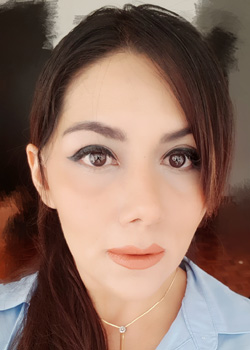
From: Instituto Nacional de Ciencias Médicas y Nutrición Salvador Zubirán, Mexico City
Visited: Hôpital Beaujon, Clichy, France under the direction of Professor Yves Panis.
I’m very thankful to the ESCP for giving me a two weeks Observership in one of the greatest centres of colorectal surgery in Europe. I am unsure how many times a Latin American surgeon has received such an honour, but I am delighted to represent the western side of the world.
Every day began with a staff meeting to discuss patients and every single type of surgical procedure followed a very strict and standardized protocol: bowel preparation, oral intake and hospitalization days according to what has been reported in literature and the results of their own studies. Before going into the OR, residents, fellows and chiefs of department share a coffee break, a moment of social interaction that I believe is truly important for the surgeons. The OR is amazing, they always have two simultaneous rooms where very highly qualified personnel begin patient preparation, they have all kinds of instruments and surgical supplies and are always prepared for the unexpected.
Another remarkable feature of the colorectal surgery department is the way they evaluate each medical case: oncologists, radiologists, nutritionists and gastroenterologists gather together each Monday afternoon and make a small presentation on each patient they consider would benefit from an operation, so decisions are based on a consensus.
Regarding the surgical approaches I could not wish for more, Beaujon works under the prerogative of “see one, do one and teach one”. A lot of things are similar to the things we do back at my hospital, a lot are not, but as an observer I’ve been able to learn and take the best from one of the bests. It was a marvellous experience, not just as a surgeon but as a foreign student, since I was little I’ve been passionate about France and this has given me the opportunity of practicing my French. What I’ve loved the most? Watching the Eiffel tower every single day from any window in the hospital. Thank you.
Miguel León
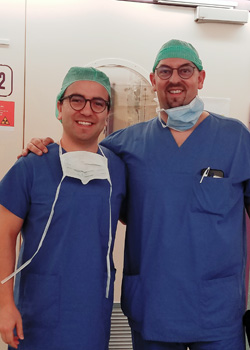
From: Hospital Universitario Fundación Jimenez Diaz, Madrid, Spain
Visited: Geneva University Hospital, Switzerland, under the direction of Professor Frederic Ris
I had the great pleasure of being selected for the two-week ESCP Observership at the Geneva University Hospital in the colorectal department hosted by Professor Frederic Ris, from 1-15 February 2019.
I received a warm welcome by all the staff members, residents, fellows, students and secretaries. The whole team was friendly and helpful. I would especially like to thank Professor Frederic Ris for his support.
I have previously referenced Professor Frederic Ris’ work many times in previous papers and read some of the excellent research that he and his colleagues have published over the years. The colorectal unit is very well equipped and organized.
During the first week I had the amazing opportunity to assist in the Advanced course in Coloproctology and Pelvic Floor Disorders, this is a well know course with excellent content, live surgeries and high-level teachers. During my second week I participated in the tumour board meeting with highly qualified consultants.
I was able to assist on daily rounds, morbidity-mortality sessions and I was able to participate and share my investigation projects with the whole surgical team. I was able to assist in proctological advanced procedures and colorectal surgeries as laparoscopic LAR with the use of Indocyanine Green Immunofluorescence.
During my Observership I had the opportunity to know the The SWISS Foundation for Innovation and Training in Surgery (SFITS) inside Geneva University Hospital, this is a modular training platform designed to simulate real-life conditions.
I am deeply grateful to the ESCP, and especially to Professor Frederic Ris and his entire team for this wonderful opportunity. This experience will be very useful to me in my daily surgical activity. I am looking forward to visiting the unit again in the near future and staying in contact with the team.
Najia Azhar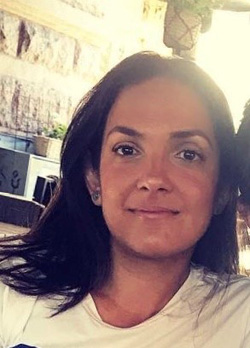
From: Sweden
Visited: Mater Misericordiae University Hospital, Dublin, Ireland, under the direction of Professor Ronan Cahill
I would like to thank you the ESCP for giving me the opportunity to embark on a two-week observership at Mater Misercordiae Hospital in Dublin, Ireland. Secondly, I would like to thank Professor Ronan Cahill and Mr Faraz Khan for taking such good care of me, and the whole surgical department for always making me feel welcome and included in all aspects of the day. At Mater Misericordiae, great emphasis is given on education and training which was very inspiring to see.
The colorectal unit does everything from large resections and CRS+HIPEC to minimally invasive surgery with both laparoscopic and robotics, so it was very nice to see how these things were kept up, as we do the same at my institution.
Professor Cahill was very kind to show me some of the collaborations that he has developed, working with ICG in trying to map the vascular and maybe in the future tumour load of patients intra-operatively, to hopefully achieve future gains, with better surgery, less leaks and more complete resections.
Being the peritoneal centre in Ireland, a lot of surgeries were CRS+HIPEC and it was interesting to see, how other sections such as upper GI, and gynecology have started doing it. Grand rounds with surgical audit was very impressive and interesting to see how all complications are recorded and discussed in a very structured mannered.
All in all, it has been an inspiring experience and I’m so happy for the warm welcome that I received, and I would recommend all surgeons to do take some time and see how things are done at other institutions.
Nikolai Kovachev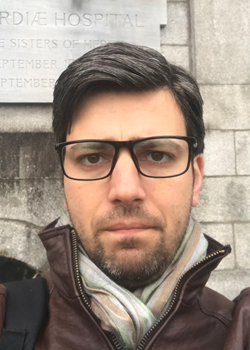
From: Bulgaria
Visited: Mater Misericordiae University Hospital, Dublin, Ireland, under the direction of Professor Ronan Cahill
I would like to express my appreciation to ESCP for participation in this program. It was a great privilege for me to have the opportunity to visit one of the biggest hospitals in Ireland. I spent my observership at in Mater Misericordiae University Hospital, Dublin under the guidance of Professor Ronan Cahill. The unique space inside the hospital; old wing with more than a 150 years' history and the new one is a great combination with benefits to both patients and students.
During my visit, I observed several laparoscopic colorectal surgeries. Of particular interest to me were the laparoscopic operations for colon and rectal cancer. It was a very educational process because the team and I spent some time in detailed explanations of the steps the day before. I observed several Cytoreductive Surgeries and HIPEC procedures and some endoscopies and as well which were performed twice a week.
The benefit of visiting such a large hospital center in a different country is the exposure to different healthcare systems. Unfortunately, two weeks is a short period to obtain comprehensive observations in different clinical cases. I witnessed the discipline of the unit and the structure. There were weekly ground rounds meetings with all team members of surgical field to discuss surgical operations, research data and I it was a great pleasure to attended them all. There were also weekly Multidisciplinary Team meetings and it was very educational to become part of it.
I am sure that the experience and knowledge I gained during this observership will be very useful for my professional development. I wholeheartedly recommend this wonderful institution to future fellowship applicants.
In conclusion I want to thank once again ESCP and Professor Cahill and Mr Farad Kahn and all his team for the kindness and hospitality.
Olena Karbovnycha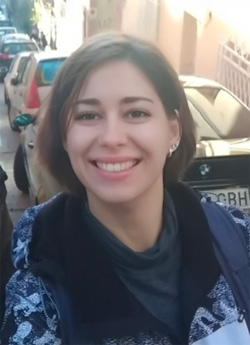
From: Kiev Regional Hospital, UA, Ukraine
Visited: Bellvitge University Hospital, Barcelona, Spain, under the direction of Professor Sebastiano Biondo
I had the great pleasure of being awarded an ESCP Observership under the direction of Professor Sebastiano Biondo, I would like to express my gratitude for this wonderful opportunity to meet new colleagues and sharing clinical experiences, this Observership surpassed all of my expectations.
During my time at Belvitge University Hospital, I attended lectures, watched live streaming of surgery, attended theatre and witnessed several complicated cases of colorectal cancer. This was of particular interest to me as I often treat such patients. I observed sometimes difficult decisions made by the specialists with regards to the choice of treatment and I also observed many laparoscopic operations for colorectal cancer. In the Ukraine this type of surgery is still under development. I was completely amazed by the robotic (Da Vinci) operation performed by Dr Kreisler and Professor Biondo. It was truly amazing to witness such a well-coordinated team of surgeons and I admire the work of my European colleagues, their tact, tolerance, calmness and respect.
I would like to mention that the organisation of the theatres was fantastic, even in the most difficult of situations, decisions were made at lightning speed, there was never a lack of professionalism or patience.
In conclusion, I would like to say that this trip had great importance for me as for young specialist. It will help me in my personal and professional development and will also improve the quality of medical care in my department with the knowledge and skills I gained from this Observership. I saw alternative ways of surgical treatment of patients with colorectal pathology and the diseases of perianal area and anal canal. I hope that I can, if not implement these methods and pass this onto experienced doctors and a generation of young specialists.
Orestis Ioannidis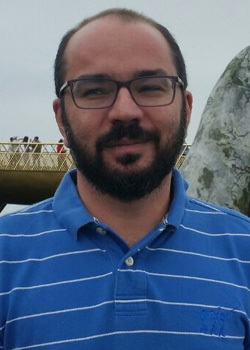
From: 4th Surgical Department, Medical School, Aristotle University of Thessaloniki, General Hospital "G. Papanikoalou", Thessaloniki, Greece
Visited: Department of Surgery, Medical University of Vienna, Vienna, Austria under direction of Professor Bela Teleky and direction of Associate Professor Stefan Riss
I had the great pleasure of being selected and awarded the two-week ESCP Observership at the Department of Surgery, Medical University of Vienna, Vienna, Austria under direction of Professor Bela Teleky and supervision of Associate Professor Stefan Riss from 20 March 2019 to 3 April 2019.
On Wednesday 20/3/2019 I arrived in the Surgical Department of the Medical University of Vienna where I was warmly welcomed by all professors, consultants, residents, fellows, students, nurses, secretaries and the rest staff members. I would especially like to express my gratitude for this wonderful opportunity first of all Associate Professor Stefan Riss but also Associate Professor Stefan Stremitzer and Associate Professor Patrick Starlinger and last but not least Professor Bela Teleky. The whole team was friendly and helpful.
The benefit of the observership is the opportunity to visit an international centre and get exposed to different healthcare systems, to meet new colleagues and share clinical experiences.
Every day started with the morning meeting of the Surgigal Department, discussing both hospitalized patients and forthcoming operations and was followed by rounds. At the same time there were surgeries taking places at a lot of different surgical theaters. I was very lucky as the first day there was a robotic TME for a rectal cancer. It was my first experience with the da Vinci robot and it was superb. The operation I observed that day was a TME with simultaneous liver metastasectomy for rectal cancer. Friday was the day of outpatient clinic which was a very interesting experience.
Next week started with a laparoscopic anterior rectopexy for rectal prolapse followed by a sigmoidectomy for a sigmoid bladder fistula caused by diverticulitis. On Tuesday I observed a sacral neuromodulation and a laparoscopic right hemicolectomy and on on Wednesday a laparoscopic TME for rectal cancer. Thursday there was no colorectal surgery so I was invited to observe a Klatskin tumor resection with left hepatectomy and on Friday following a ventral hernia repair there was a laparoscopic extended right hemicolectomy for synchronous cecum and transverse colon cancer. My last days were also very interesting with a HIPEC procedure and an open sigmoidectomy for acute bowel obstruction.
Because an observership is beyond all other things a trip to a foreign country and an acquaintance with a foreign civilization, on both weekends I had the opportunity to go sightseeing in Vienna which is a very beautiful and aristocratic city and to try the local cuisine.
This productive fellowship will be very useful to me in my daily surgical practice. Overall it was a wonderful experience and I must thank my hosts who made me feel so welcome, and especially once again Associate Professor Stefan Riss, and I am very grateful to ESCP for making that happen.
Plamen Petkov
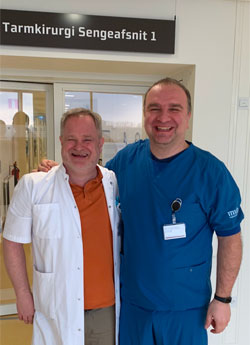
From: Alexandrovska University Hospital, Sofia Bulgaria
Visited: Aarhus University Hospital Denmark under the direction of Professor Peter Christensen
In January 2019, I had the privilege to visit the outstanding and incredible Aarhus University Hospital as an ESCP Observer for two weeks. I would like to express my gratitude to the consultant surgeons, fellows, nurses, supportive staff and the ESCP community for a wonderful and extremely valuable experience.
The benefit of visiting an international centre is exposure to different healthcare systems. Unfortunately, two weeks is a short period to obtain comprehensive observations in different clinical cases and to increase my surgical skills. During my time here I witnessed the discipline of the unit and the structure. There were daily ward meetings with all team members and nurses to discuss all surgical operations, surgery took place daily and I attended them all.
During my stay, I was able to scrub for coloproctology procedures including open, minimally invasive, benign proctology and advanced disease. There was a variety of coloproctology with an emphasis on colorectal cancers due to the understandable pressures on expediting these cases. Most cases were laparoscopic, I witnessed a robotic surgery using the Da Vinci Xi robot. Being a University Hospital, the surgeons are involved with many studies and new techniques including the use of autologous fat transplantation for perineal defects. Other procedures included combined endoscopic laparoscopic surgery (CELS) for large polyps.
It was a very productive fellowship, and I must thank my hosts who made me feel so welcome and I would like to thank ESCP for this wonderful opportunity. I wholeheartedly recommend this wonderful institution to future fellowship applicants.
Sofia Xenaki
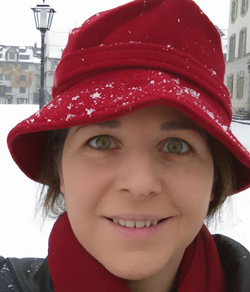
From: Department of General Surgery, University Hospital of Heraklion-Crete Greece
Visited: University Hospital of Geneva, Switzerland, under the direction of Professor Frederic Ris
It was my great honor and pleasure to be a recipient of ESCP Observership. I had the privilege to do my Observership in the field of colorectal surgery and coloproctology in the University Hospital of Geneva (Hopitaux Universitaires Geneve HUG), Switzerland, under the supervision of Professor Frederic Ris.
The colorectal and coloproctology department in this hospital is a high-volume referral centre providing a full range of colorectal services including colorectal cancer, perianal diseases, inflammatory bowel diseases, functional bowel, and pelvic floor disorders. The colorectal department has an extremely well-established and well-equipped laparoscopic colorectal service.
During my time there I had the chance to attend a large number of advanced laparoscopic and open surgical operations for benign/malignant colorectal and proctology diseases as well as complex pelvic floor disorders.
One of the most interesting and exceptional time was the fact that I had the chance to get to know the Fluorescence Imaging Surgery, an innovative technique performed here in HUG by Prof Ris and his team. I had the chance to discuss my concerns and learn various innovative techniques. Moreover, I had the chance to learn more about the DaVinci surgical system and observe robotic colorectal operations which were very interesting.
Surgical-Radiology and Multi-disciplinary team (MDT) meetings for colorectal cancers and colorectal pelvic floor diseases also gave me the time to learn proper management and decision-making for complicated colon and rectal cancers, functional bowel, and pelvic floor problems.
In general, this clinical fellowship provided me with an excellent opportunity to improve my surgical skills and clinical knowledge in colorectal surgery. I am sure that the experience and knowledge I gained during my Observership will be very useful for my professional development. From the bottom of my heart I would like to express my sincere gratitude to Prof. Frederic Ris, and his colleagues Dr Buchs and Dr Liot, for the time they spent with me, their kindness, the great hospitality and the exceptional behavior they showed towards me. Many thanks to the whole surgical team too for their kindness.
In conclusion I am very grateful to ESCP for affording me this clinical observership opportunity.

